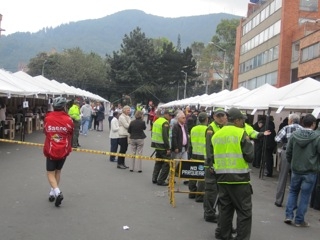
Election Day in Bogota. Oct. 30, 2011. Police stand watch over polling stations.
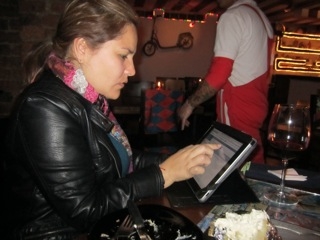
When the death of Alfonso Cano was announced on Nov. 4, my dinner with Social Media Editor Renata Cabrales went bust.
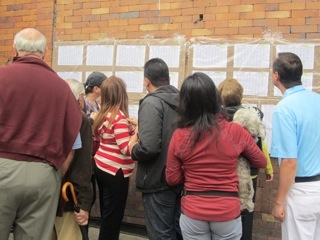
Election Day in Bogota. Citizens look for their voting table.
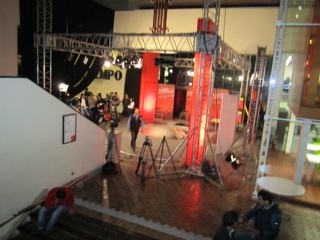
Setting the stage for the debate between Bogota mayoral candidates Oct. 27, 2011.
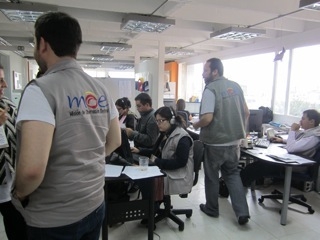
At Election Observer Mission headquarters in Bogota on Election Day.

Natalie Gomez of El Tiempo's social media team sends out updates about the Oct. 27 debate between the top three candidates for mayor of Bogota.
The end of October and the beginning of November were monumental times in Colombia. New mayors and governors were elected in a mostly fair and mostly clean vote on Oct. 30. A former guerrilla was elected mayor of Bogota. In pockets around the country, some violent protests erupted, sparked by allegations of fraud and vote tampering. And if that wasn’t enough for a news-filled week, late on Nov. 4, the Colombian military announced it had killed Alfonso Cano, top commander of the Colombian Revolutionary Armed Forces or FARC.
Whew, what a week.
In Bogota, even though Gustavo Petro, had been predicted to win, his electoral victory was big news. Petro began his political career with the M-19 guerrilla movement, but when M-19 renounced armed struggle and became a political party, Petro was there. He has been at the fore of Colombian politics ever since, and when he takes office as Bogota mayor on Jan. 1, 2012, he will hold the second most important electoral office in the country.
I watched Petro debate with his two main opponents, Enrique Penalosa and Gina Parody, three days before the election. The debate was hosted by El Tiempo, Colombia’s major newspaper. Penalosa and Parody were pretty strident with each other in their bid to win the votes of Colombian moderates. Petro stayed out of the fray and, if anything, played the diplomat, getting everyone to agree that win or lose they would work together on behalf of Bogota.
It was a frantic evening in the El Tiempo newsroom, of course, a prelude to Election Day. Not only were stories being written and produced for the media giant’s print and online publications, but stories had to be reworked and packaged for El Tiempo’s two TV channels. And of course, the debate was a natural fit for social media. The El Tiempo Twitter team was in top form.
Fast-forward three days to the election itself. At the Electoral Observer Mission (MOE) headquarters in Bogota, dozens, and eventually hundreds of reports came in from citizens denouncing vote irregularities. I was keeping tabs on MOE reports; especially those being posted to the crowd-sourced MOE electoral coverage map.
In most cases, winners were declared a few hours after the polls closed. MOE reported 55 violent incidents in the period immediately before and after the elections. In 2007, there were only 22 incidents of post-electoral violence reported. But in a few controversial races, there were still no official winners five days after the voting occurred, on Nov. 4.
But public interest in those races (except for those directly involved) went onto a backburner that night. That’s when the Colombian military announced Colombian soldiers had killed FARC’s top commander in battle in the Department of Valle. I was at dinner with El Tiempo Social Media Editors Renata Cabrales and Natalie Gomez when we got the word. Dinner, obviously, was a bust. Natalie left for the office; Renata pulled out her trusty iPad and began filing tweets and Facebook postings. Cano’s death was big. President Juan Manuel Santos said it was “the biggest blow” against the FARC in the group’s history.
Cano’s death could distract the media for a while, but by Monday, it was back to electoral business as usual. Except in some towns like Sabaneta, where a recount was taking place eight days after the elections. A winner was declared late Monday following a power outage, when the candidate who was losing before the lights went out, emerged victorious after electricity came back on.
Well, they never said things would be quiet in Colombia.
Editor's note: Ronnie Lovler is a Knight International Journalism Fellow working with journalists at El Tiempo, the largest newspaper in Colombia. She is helping them use new technology to track election issues, crime and corruption.